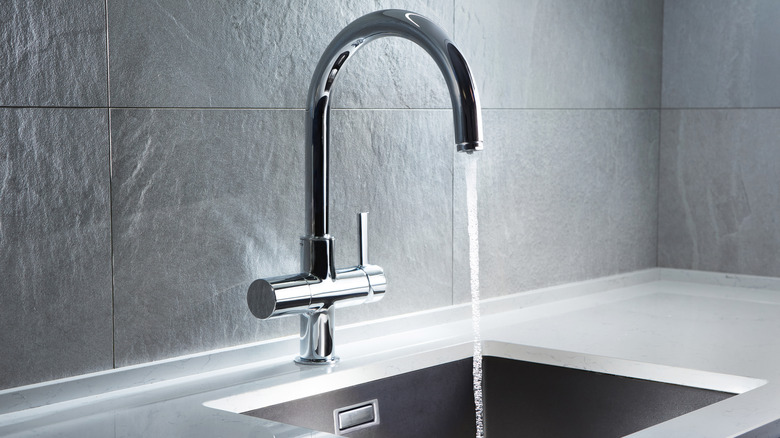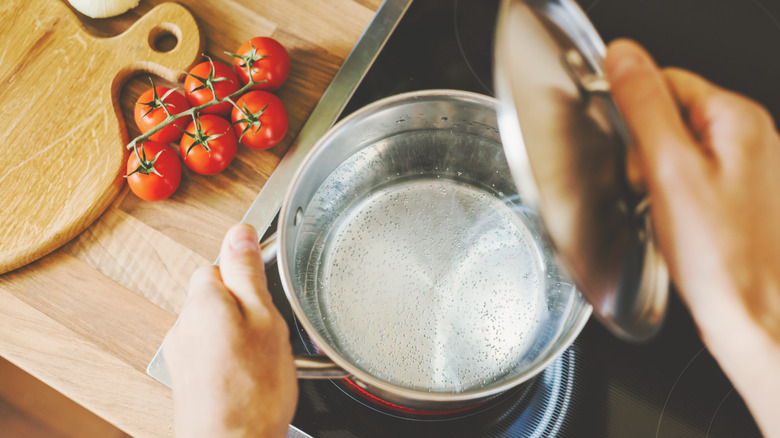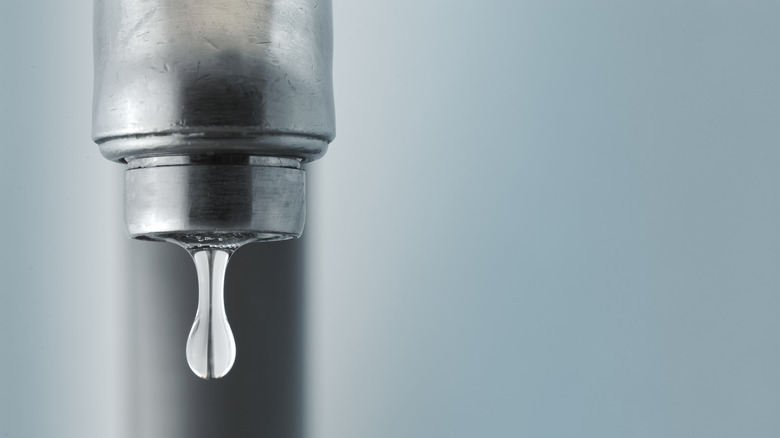The Safety Reason You Should Avoid Cooking With Hot Tap Water
Cooking tends to involve a lot of waiting — preheating, resting, proving, etc. — so it makes sense to want to take shortcuts where you can, especially when you're already hungry. If you want to boil water quickly, it seems natural to use hot tap water so that it takes less time to heat up on the stove. But wait: There's one very good reason to not run hot water for anything you're going to consume, and it has to do with safety.
Virtually all pipes, even those being manufactured today, have some amount of lead in them (and the older the pipes, the greater the amount of lead they're likely to contain). Lead is highly toxic. According to the U.S. Environmental Protection Agency, heat causes lead to dissolve more quickly, so when you run hot water from the tap, it's likely to have picked up more lead from the pipes than cold water would have. Hot water is also more likely than cold water to carry bacteria, which can be potentially harmful.
This isn't some extreme precaution, either — both the EPA and the Centers for Disease Control and Prevention (CDC) advise always using cold tap water for cooking or drinking, to minimize the amount of lead going into food and drinks. Lead poisoning is no joke, and at high enough concentrations, it can be fatal. This is one area where you'd be wisest to err on the side of caution.
(Don't) get the lead out
Even if you live in a brand-new house, there's the potential for lead to enter your water. Legislation passed in the latter half of the 20th century has limited the amount of lead that manufacturers can use in pipes, but even today, it's not zero; modern pipes can still contain up to 0.25% of the metal. If you live in an older building, the risk is significantly higher. Plumbing systems fitted before 1986 may include as much as 8% lead in the pipes. If your house dates back to the 1950s or earlier, those pipes could contain as much as 50%. Other plumbing elements besides pipes, like faucets and welding solder, may also contain lead, which hot water can coax out on its way into your cup.
Given that authorities like the World Health Organization don't consider any amount of lead to be safe, it's best to do everything you can to avoid lead exposure, especially if you have young children or pregnant people in the house. Lead poisoning can affect anyone, but babies and children younger than six years of age are the most vulnerable, as lead can cause major problems in neurological development. Lead can also stay and build up in the body throughout one's life — it's not something your body can process and be rid of within a day or so, as with food or alcohol poisoning.
Keep your cool
Lead exposure isn't the only reason to avoid running your tap water hot. Your hot water heater is a nice, cozy environment for bacteria to grow, including bacteria that could be potentially harmful if consumed. The water in your hot water heater is stagnant, which allows bacteria and fungi to grow freely. Since the water is meant for kitchen use, it's not treated with sanitizing chemicals like chlorine, the way a swimming pool is. The good news is that these microorganisms can be killed by simply boiling water for 1-3 minutes, per the CDC. Do know, however, that lead doesn't work the same way — it's not alive, so it can't be killed like bacteria or fungi, and boiling won't do anything to remove it.
Fortunately, one important and simple way to minimize your potential exposure is to only run the tap water cold if you're using it for anything that's going to be consumed by a person or pet. If you need your pasta urgently, you can always run cold water and heat it up in an electric kettle or even a Keurig before putting it on the stovetop.


